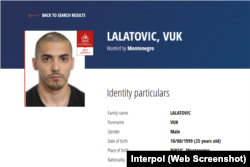“Organized Murders in Montenegro: A Consequence of Unchecked Justice Delays”
In connection with two double murders in Cetinje and Podgorica attributed to criminal clans, police are focusing on individuals released from custody due to the court not having overturned the initial verdict for prior offenses.
According to the Criminal Procedure Act, detention of the accused is lifted unless the court issues a first-instance verdict within three years of the indictment.
The police report that 70 members of criminal groups were released from custody following the announcement of the first-instance verdict, with half of these cases occurring in the past year.
While courts order supervision of the accused upon their release from detention, some defendants have committed further murders shortly thereafter.
The recent murders have sparked discussions regarding the accountability of the judiciary and police in managing the release of repeat offenders who have yet to await their first-instance verdicts. Is the responsibility resting with the courts for not issuing verdicts within legal deadlines, or with the police for monitoring those out of detention?
Bojana Malović from Human Rights Action (HRA) stated to Radio Free Europe that the responsibility should be shared:
“This necessitates a coordinated effort from all three branches of government, rather than a populist shift of blame,” she emphasized.
Malović added that after individuals are released from custody, courts often impose measures like home confinement:
“The police are responsible for monitoring the implementation of these measures. However, electronic monitoring, which is crucial for effective enforcement of these measures, is still non-operational. The government bears absolute responsibility for promptly arresting anyone who violates monitoring conditions.”
She noted that amendments could be introduced so that violations of supervisory measures by the accused would constitute grounds for re-detention.
From custody back to criminal clans
Following the double murder and injuries stemming from an explosive device incident in Cetinje on June 20 of this year, police announced the arrest of a suspect charged with murder.
“On November 11 of last year, he was released from detention because the first-instance verdict had not been issued,” said Assistant Police Director Lazar Šćepanović.
The individual is believed to be a member of the Kava criminal clan.
This pattern was echoed after the second double murder in Podgorica on November 6.
Schepanovic stated that Vuk Lalatović, the direct perpetrator who was released from custody at the end of May after serving three years because of the absence of a first-instance verdict, is involved.
“This individual committed a serious murder in Nikšić in 2019, with all material evidence collected. And after three years, he immediately breached certain supervisory measures,” remarked Schepanovic.
Žarko Pejaković, linked to multiple crimes, also emerged from custody on October 25 of this year due to the absence of a first-instance verdict within the three-year limit.
Both Lalatović and Pejaković are believed to be associated with rival clans: Lalatović with the Scales and Pejaković with the Kava clan.
These two criminal factions have been in conflict since 2014, primarily over control of drug trafficking.
The Minister of Police blames the courts
The Montenegrin judiciary has come under scrutiny from the Minister of Internal Affairs, Danilo Šaranović, who recently stated that since 2018, 70 members of criminal organizations have been released from detention due to delays in first-instance verdicts.
According to Šaranović, half of these releases occurred in the past year.
He noted that the last five clashes between criminal groups arose immediately after individuals involved—whether as victims or perpetrators—were released.
“All for the same reason: inefficient court procedures, specifically the lack of prompt verdicts,” assessed the Minister of Police.
He lamented that the release of dangerous individuals has become a nearly daily occurrence:
“We combat crime while certain judges fail to deliver verdicts within three years.”
Judiciary: Police should oversee those released
The court council deemed the Minister’s remarks about judges failing to issue timely verdicts as an unreasonable indictment of the judiciary’s impact on criminal activities.
“Six judges within the Special Department of the High Court are handling 160 cases related to organized crime and corruption. The courts’ efficiency suffers from objective limitations, including insufficient judicial staff and courtroom spaces,” the court council stated.
Bojana Malović from HRA highlighted that the special department’s efficiency is hindered by overwhelming caseloads, inadequate technical and workspace conditions, as well as procedural tactics frequently employed by defense attorneys:
“These factors adversely affect efficiency, often leading to first-instance trials exceeding three years, resulting in the release of the accused.”
The Judicial Council also dismissed the notion that the expiration of detention is the root cause of rising criminal activities:
“Upon release, the accused are subjected to supervisory measures, including residential restrictions. This was applicable in the recent murders in Podgorica, where execution of these measures rests with the police,” they stipulated in response.
The Ministry of Justice also confirmed to RSE that monitoring measures are carried out by the police.
“The Ministry of Justice is not tasked with implementing supervision measures, as the decisions made by respective courts are not submitted to the Ministry.”
When inquired about who oversees electronic monitoring, the Ministry indicated they hold that authority only for cases involving final judgments predicting incarceration penalties.
Proposed solution from ruling majority: Extend detention limits
The ruling coalition in the movement of Europe, led by Prime Minister Spajić, has suggested that the maximum detention period before trial could be increased from three years to five years for certain defendants.
“Crimes such as organized crime, terrorism, and war crimes are intricate and often involve multiple perpetrators, witnesses, and international elements,” stated Vasilije Čarapić of PES following the recent double murder in Cetinje.
However, legal experts have warned that such an extension of detention periods could contravene Montenegro’s Constitution and the European Convention on Human Rights.





